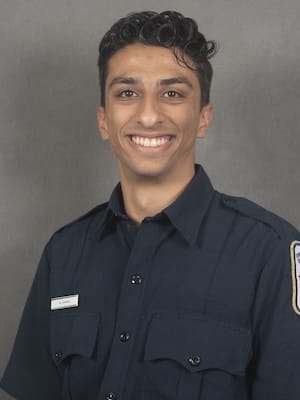Mohammad Chanaa is a healthcare professional and community volunteer dedicated to delivering compassionate, high-quality care in both clinical and emergency settings. A graduate of George Mason University with a background in Biology, Microbiology, and Sociology, Chanaa’s journey into medicine was significantly influenced by the COVID-19 pandemic. Witnessing the impact of healthcare workers during this time, he transitioned from a pre-medical track to hands-on service as an EMT and volunteer firefighter.
Accumulating thousands of hours supporting patients and the community, Chanaa currently serves as Clinical Lead at a prominent outpatient cardiology practice. Here, he oversees clinical operations while managing care for critically ill patients recovering from hospitalization. Concurrently, he holds the role of Deputy Chief at his local volunteer fire department, where he also serves as a board member and academy instructor. This dual engagement in prehospital and outpatient care reflects his belief in providing compassionate service across all stages of patient health. This article presents a detailed interview with Chanaa, exploring his background, journey, and key insights.
Establishing Professional Identity and Values
What inspired you to choose your current profession, and how has that passion evolved?
My path into healthcare wasn’t a straight line—it was more of a gradual realization shaped by experience and exposure. Early on, I gravitated toward medicine, drawn to the idea of making a meaningful difference. I pursued studies in biology and the sciences, thinking I’d eventually become a doctor. But it wasn’t until I had real-world exposure, especially during the pandemic, that I started to see the bigger picture of what a healthcare career could look like.
It was during that time I found myself deeply impacted by the stories of frontline responders. That visibility opened my eyes to other roles in medicine, particularly in emergency services. I began volunteering as a firefighter and EMT, and that work changed everything for me. It gave me a direct, hands-on way to serve people in crisis, and I found myself not only challenged but fulfilled. The adrenaline and urgency of emergency care taught me how much I value being present in the moments that matter most.
Eventually, I moved into outpatient cardiology, where the pace is different but the responsibility is just as high. I began to see healthcare through multiple lenses—pre-hospital care, chronic condition management, clinical leadership—and I realized that the role where I could do the most good, both for patients and my team, was as a Physician Assistant. What draws me to that path is the continuity, the collaboration, and the opportunity to lead from both a clinical and a human-centered place.
What began as a vague idea of “becoming a doctor” has evolved into a much deeper understanding of what it means to care for others. Today, I’m driven not by titles, but by the impact I make. And I’ve learned that the way we help people often matters just as much as the help itself.
Can you describe a turning point or major lesson that significantly influenced your career path?
Growing up, one of my major career aspirations was to be a doctor. I set out to pursue that in High School and University, studying Biology, Microbiology, and Sociology. For much of that time, I did not necessarily understand what I truly wanted to do with my life and career. I knew I wanted to be a doctor, but I didn’t know what that entailed or what it looked like on a day-to-day basis. Partway through my second year in University, the COVID-19 pandemic swept the nation and the world, during which healthcare as a field got more exposure than it ever had. Everywhere I looked, I saw stories of nurses, healthcare workers, doctors, researchers, firefighters, paramedics, and more chronicling their battles and challenges. This provided me with the chance to learn more about the field that interested me. In doing so, I discovered my first passion for healthcare in Fire and EMS. I began volunteering my time as an EMT and Firefighter ahead of my graduation. I dedicated hundreds of hours of my time, which soon became thousands of hours, to treating patients, caring for the fire station and its vehicles, participating in community events, and more.
My time spent there taught me that there are more direct ways to better help others than becoming a doctor, which led me to begin working at an outpatient cardiology practice, where I treat some of the sickest and most critical patients after they leave the hospital and make sure they are getting the care they need while also leading the clinical side of the office I work at and keeping the operations afloat. I grew both in my role as a volunteer and in my job, progressing to a Deputy Chief at the fire department as well as a member of the executive board and academy instructor, simultaneously I was able to start as a technician in my current job and progress to becoming the Clinical Lead of a new office and team.
How do your core values guide the way you lead and work with others in your community or profession?
My primary core value is compassion. Often, we can become accustomed to our jobs and their repetitive nature, but one of the first things I learned was that when people call 911 or go to the hospital, it is because they are having the worst day of their lives and need help. Anyone who has worked in these fields can attest to the routine and desensitization that come with that line of work, something I often see. I firmly believe, however, that one must do their best to retain their compassion and humanity.
Treating a patient without being a caring and compassionate person is ultimately unhealthy for both the patient and the provider. When someone goes to the hospital or sees a specialist, they don’t want to feel like they are just another number. They want to feel seen and heard as the people they are, not rushed in and out, not dismissed or sidelined, and not told that they’re exaggerating or that the problem is all in their head. These unsustainable behaviors are, unfortunately, all too common and do not provide proper care. I strive to counteract that trend in healthcare by taking the time to consider situations from the patient’s perspective and critically examining my skepticism and cynical thoughts. This mindset is one that I have been able to relay forward and teach in both my volunteer and career roles, where I am responsible for training and leading others. I try my best to convey my ideas to my patients, which in turn has resulted in slow but steady shifts in attitude in those around me and those that I oversee or am responsible for.
The Editorial Team at Healthcare Business Today is made up of experienced healthcare writers and editors, led by managing editor Daniel Casciato, who has over 25 years of experience in healthcare journalism. Since 1998, our team has delivered trusted, high-quality health and wellness content across numerous platforms.
Disclaimer: The content on this site is for general informational purposes only and is not intended as medical, legal, or financial advice. No content published here should be construed as a substitute for professional advice, diagnosis, or treatment. Always consult with a qualified healthcare or legal professional regarding your specific needs.
See our full disclaimer for more details.








